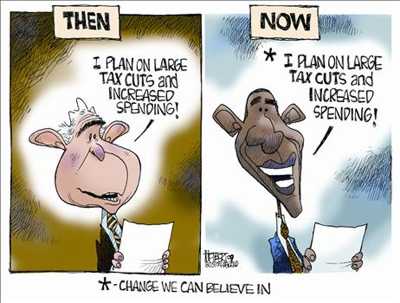By Marisa Taylor

Cartoon by IlliniPundit.com
Although the FBI has acknowledged it improperly obtained thousands of Americans' phone records for years, the Obama administration continues to assert that the bureau can obtain them without any formal legal process or court oversight.
The FBI revealed this stance in a newly released report, troubling critics who'd hoped the bureau had been chastened enough by its own abuses to drop such a position.
In further support of the legal authority, however, the Justice Department's Office of Legal Counsel backed the FBI in a written opinion issued this month.
The opinion by the OLC — the section that wrote the memos that justified enhanced interrogation techniques during the last administration — appears to be yet another sign that the Obama administration can be just as assertive as Bush's in claiming sweeping and controversial anti-terrorism powers.
The Justice Department's watchdog, the inspector general, said the OLC opinion has "significant policy implications that need to be considered by the FBI, the Department, and the Congress."
"The FBI says that this kind of activity is in the past," said Michael German, a former FBI agent who's now the American Civil Liberties Union's policy counsel. "But if they're saying that they have a continuing legal authority that means it's not in the past."
In another similarity to Bush era-legal decisions to keep legal theories under wraps, Obama's Justice Department refused to release to McClatchy the OLC opinion, despite the administration's vow to be more open than its predecessors.
The little-noticed revelation about the OLC opinion and the FBI's legal position appears in a heavily redacted section of an inspector general's report released Wednesday.
In the report, Inspector General Glenn Fine concluded the FBI committed egregious violations of the law when it obtained thousands of telephone records without court oversight or through any formal legal process.
The report described a "casual" environment in which FBI agents and employees of telecom companies treated Americans' telephone records so cavalierly that one senior FBI counter-terrorism official said getting access to them was as easy as "having an ATM in your living room."
Yet it also stated that "the OLC agreed with the FBI that under certain circumstances (word or words redacted) allows the FBI to ask for and obtain these records on a voluntary basis from the providers, without legal process or a qualifying emergency."
FBI and Justice Department officials refused to comment on that assertion.
In a letter sent Friday, Sens. Russ Feingold, D-Wis., Richard Durbin, D-Ill., and Ron Wyden, D-Oregon, demanded that Attorney General Eric Holder release a copy of the memo.
"Although much of the information about the OLC opinion is redacted in the public version of the (inspector general) report, the opinion appears to have important implications for the rights of Americans," the senators wrote.
FBI Director Robert Mueller has said that the informal practice of requesting telephone records as described in the report was stopped in 2006 when he found out about it from the inspector general.
Since then, it appears the bureau now refrains from using the authority it continues to assert, according to another heavily redacted section of the inspector general's report.
"However, that could change, and we believe appropriate controls on such authority should be considered now, in light of the FBI's past practices and the OLC opinion," Fine warned.
Privacy and open government advocates called on the Justice Department to release the opinion outright.
"There's a tremendous mystery as to what this legal basis is," said Kurt Opsahl, senior staff attorney for the Electronic Frontier Foundation, a nonprofit that advocates privacy protections for technology. "It does not seem like a legal justification should be a national security secret."
Last March, Attorney General Eric Holder released Bush administration OLC memos justifying interrogation methods that Bush's Justice Department had refused to release.
"It is my goal to make OLC opinions available when possible while still protecting national security information and ensuring robust internal executive branch debate and decision-making," he said at the time.
Such rhetoric hasn't necessarily translated into action, however, according to the Citizens for Responsibility and Ethics in Washington, an open-government group. CREW released a report this week that criticized the Obama administration for recent decisions to withhold information.
"Judging by CREW's interactions with various federal agencies over the past year, the promise of transparency and openness has not translated into new government-wide . . . policies," the group said.
The American Civil Liberties Union, meanwhile, filed a lawsuit Friday to try to compel the Justice Department to make public a report from Justice's Office of Professional Responsibility that examines possible ethics violations by lawyers who wrote the interrogation memos.
Holder had said in late November the report was finished and would be released soon.
Friday was also the deadline for executive branch agencies to release certain "high-value" data as part of President Obama's open government directive. Open government experts, however, said it remains to be seen how useful the information will be since the agencies themselves are determining what to divulge.
As of Friday afternoon, for example, the IRS had released its files tracking citizens' changes of addresses and the Department of Housing and Urban Development posted federal housing inspection data.



